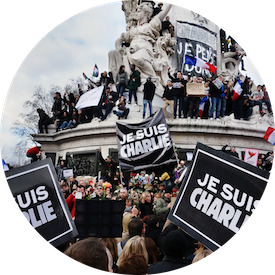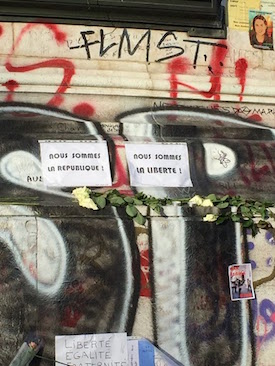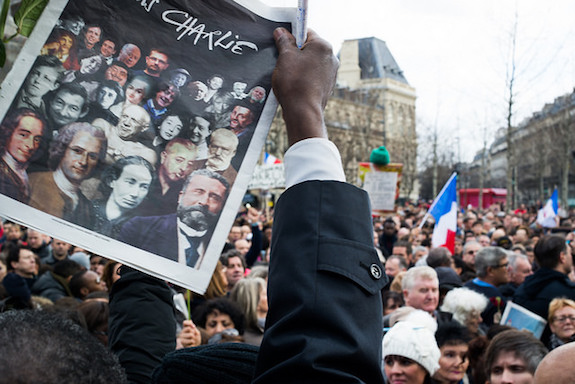Nous sommes la France: the taboo question of French national identity
 Since the events that shook French society on 7 January 2015, the leitmotif that inundated the entire internet sphere, ‘Je suis Charlie’, has contributed more to the survival of the French language against the hegemony of English than have decades of desperate efforts to preserve it.
Since the events that shook French society on 7 January 2015, the leitmotif that inundated the entire internet sphere, ‘Je suis Charlie’, has contributed more to the survival of the French language against the hegemony of English than have decades of desperate efforts to preserve it.
If I were a teacher of French as a foreign language, I would start my first lesson to absolute beginners with this sentence written on the blackboard.
Amidst the great flood of people who marched in Paris on 11 January 2015, another phrase stood out on a post, an apparent statement that triggered more questions instead of confirming the hope and comfort confused French people were trying to find. In a brilliant twist and declension, ‘I am’ became ‘we are’, and ‘Charlie’ was replaced by ‘la France‘: ‘Nous sommes la France’.
This word play did not escape the attention of political journalist Natacha Polony, a brilliant and respected figure in the French media.
I would not be surprised if her newly published book, the matter-of-factly titled ‘Nous sommes la France’, became a national bestseller of non-fiction literature.
A year of dangerous living: the book in its social and economic context
The Unity March only lasted for a day. Dissonant voices rose quickly afterwards. The negative form of ‘je suis‘ started to be voiced in the media, in the streets and at schools.

Now, at the eve of the United Nations climate change conference (COP21), discontent is widespread throughout France. With an unemployment rate rising faster than global warming, strikes regularly breaking out, and the questioning of the socialist government’s authority (often criticised as being too weak and inefficient by some and too liberal by others), nobody is satisfied.
Facing this context of unemployment and social unrest, as well as the recent terrorist attacks, the French are divided and have lost their bearings.
Added to this is the migrant crisis and the rise in popularity of the National Front party, who are luring in more and more disgruntled people (whose bitterness often leads them to confuse the issue of religious terrorism with that of the migrant crisis), and you can easily picture the complete disarray – or at least, what seems to be.
Who is ‘nous’ and what is ‘France’: Polony’s take on French national identity
In her book, the French essayist often turns to French history to discuss the major identity crisis France must overcome, even if it is not for the first time. However, in our modern society, this question takes a different turn and must not be underestimated.
Polony admits that the prevailing politically correct attitude can be as much a barrier to finding a solution as the far-right intransigence. Her reference to the tyranny of vocabulary is a particularly interesting illustration. When the French president, for example, used the expression ‘français de souche‘ (as opposed to French from where?), it unleashed a barrage of criticism.
Polony also regrets that, at some point, detractors attempted to turn the culprits of the Charlie Hebdo attacks into victims and blame France for their crimes.
Hence, there is an absolute need for the French – all of them, with no exception – to recognise that they share a common destiny and common values. In that perspective, the responsibility lies within the classroom to teach French history to all, and to reintroduce the study of authors who have shaped this country. These are what make France what it is, and is what the French people should have in common beyond their differences. Cohesion is the keyword.
Therefore, if ‘we are France’, the time has come to call a spade a spade, and to clearly answer the taboo question of national identity. France is more than just an administration run by technocrats. It is a mosaic of ‘terroirs’ and diverse landscapes that makes it the most popular tourist destination in the world.
When asked how she would define France, Natacha Polony quoted two beautiful words: ‘la vergogne’ (an old word which means the opposite of arrogance) and ‘la ferveur’.
‘Nous sommes la France‘: linguistics and beyond
This book is for anyone eager to understand France: its present, past, culture, political debates and state of society. Polony does not force readers to agree with her point of view; rather she gives them the freedom to make up their own minds.
It is not necessary to be fluent in French to read through this 200-page essay. Clear and direct, the former teacher of French writes using modern language in a very fluid and elegant style.
Lastly, this treatise on France struck a very emotional chord with me. As I was turning the last page, I realised Polony perhaps did not only intend to discuss French national identity. I could hear another, more profound message: a moving declaration of love for the country of France. And this was worth a thousand ‘La Marseillaise‘.
Really, who would complain about that here at MyFrenchLife™?
What are your thoughts on this debate? Join the discussion in the comments below.
Image credits:
1. Je suis Charlie, Paris 11 January 2015, by Olivier Ortelpa, via Wikimedia Commons.
2. © Jacqueline Dubois Pasquier.
3. Paris Unity March for Freedom 2015, by DB Young, via Flickr.
4. Statue of the Republic, Place de la République, Paris, by David McKelvey, via Flickr.









This article was fantastic! Incredible that it was written just before the second attacks. Reading this article was like re-living the aftermath; not the unity, but the dissonance. I have a mostly liberal newsfeed on Facebook so I didn’t have to hear too much racism, but the radically liberal side was the ‘je ne suis pas charlie’, and that was hard to experience too. I keep talking about unity, about the real question, which is how is ISIS managing to recruit young French men who weren’t raised in radicalism? Harnessing the anger of adolescence for war is an age old practice, but why don’t these young French men feel French? What part does France’s national identity crisis play in creating it’s own enemies, and what part can expanding and embracing a more global French identity play in finding the solution? Brilliant, brilliant article. Thank you for sharing!! I’m going to have a read of this essay right away
Kerrin, I am glad you like the article and I wish you a very happy reading! You are asking the very questions that have been raised everyday in France in the media since 13 November. The change now is that people dare talk about this issue of young French nationals who turn against France or just simply do not adopt its values. Until now, it was considered to be not politically correct to even hint at it.There will be a national homage paid by President Hollande to the victims of the attacks at ‘Les Invalides’ on 27 November and the French are encouraged to show their attachment to the nation that day. Already the French flags are selling like hot cakes, so there is hope …
That’s really interesting about the change in attitude, Jacqueline. Why do you think it’s different this time round? Why are people daring to actually approach the issue? Is it just a matter of having had enough (ie two attacks in one year)?
I find this whole debate really interesting because we’re asking ourselves similar questions here in Australia too (although perhaps not quite to the same extent as in France).
According to political analysts, this time it is different because, even though the French had united on 11 January to show their support, they had not totally felt concerned as particular groups of people or communities had been targeted (journalists at Charlie Hebdo, Jews at grocery store). On 13 November, everybody, regardless of their origins, age or color of skin, profession, religion … could have been a victim. It is true Kenaira that nowadays any Western country can be attacked and Australia is one of them. The wars are waged in a total different way.